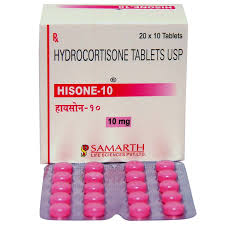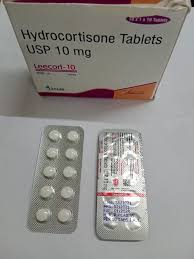Cortisone tablets are among the most commonly prescribed medications for reducing inflammation and treating various conditions associated with the immune system. Cortisone, a type of corticosteroid, mimics the effects of hormones naturally produced by your adrenal glands, helping to control inflammation and the body's immune responses. While cortisone injections are often used to provide localized treatment, cortisone tablets offer a systemic solution for managing inflammatory conditions. This blog will explore what cortisone tablets are, their uses, benefits, side effects, and how they should be taken.
What Are Cortisone Tablets?
Cortisone belongs to the corticosteroid class of drugs, which are synthetic versions of the hormone cortisol. Cortisol is a hormone naturally produced by the adrenal glands and plays a critical role in regulating several processes in the body, including metabolism, the immune response, and the body’s ability to handle stress. Cortisone tablets work by decreasing the immune system’s inflammatory response, which can reduce symptoms of pain, swelling, and allergic reactions.
The tablets are typically used as part of a broader treatment plan for chronic inflammatory conditions or autoimmune diseases. They are available in various strengths and are prescribed based on the severity of the condition and the individual’s health.
Common Uses of Cortisone Tablets
Cortisone tablets are prescribed to manage a variety of medical conditions. Some of the most common include:
Arthritis: Rheumatoid arthritis and osteoarthritis can cause debilitating pain and inflammation in the joints. Cortisone tablets help reduce inflammation, alleviating pain and improving mobility.
Asthma and Allergies: Cortisone tablets may be prescribed for short-term treatment during severe asthma attacks or severe allergic reactions when other medications fail to control symptoms.
Autoimmune Diseases: Conditions such as lupus, multiple sclerosis, and Crohn’s disease occur when the body’s immune system mistakenly attacks its own tissues. Cortisone suppresses this overactive immune response, helping to control symptoms.
Skin Conditions: Severe cases of skin diseases like eczema, psoriasis, and dermatitis can be treated with oral corticosteroids, particularly when topical treatments do not provide sufficient relief.
Inflammatory Bowel Disease (IBD): Conditions like ulcerative colitis and Crohn's disease, characterized by chronic inflammation in the digestive tract, can be managed with cortisone tablets to help reduce flare-ups.
Cancer Treatments: Corticosteroids, including cortisone, are sometimes used alongside chemotherapy to reduce inflammation, alleviate pain, and manage other cancer-related symptoms.
Adrenal Insufficiency: In cases where the body fails to produce enough cortisol naturally (Addison’s disease), cortisone tablets can be prescribed to make up for this deficiency.
How Do Cortisone Tablets Work?
Cortisone tablets work by suppressing the activity of the immune system. Normally, when the immune system detects harmful stimuli, it releases chemicals that cause inflammation as a defense mechanism. However, in many chronic illnesses, the immune system’s response is excessive or misdirected, leading to painful inflammation that does more harm than good.
By inhibiting the release of pro-inflammatory substances, cortisone helps reduce swelling, redness, and pain associated with inflammation. It can also prevent the immune system from attacking healthy tissues in autoimmune disorders.
Benefits of Cortisone Tablets
The main benefit of cortisone tablets is their ability to provide rapid and effective relief from inflammation. This can be particularly valuable for individuals suffering from chronic conditions that cause long-term pain or discomfort. Here are some of the primary benefits:
Reduced Pain and Inflammation: Cortisone tablets provide relief from pain and swelling in conditions like arthritis, asthma, and inflammatory bowel diseases.
Improved Quality of Life: For people with autoimmune diseases or chronic inflammatory conditions, cortisone can offer long-term relief, improving daily functioning and overall quality of life.
Systemic Treatment: Unlike topical treatments, cortisone tablets offer systemic relief, meaning they work throughout the body to manage widespread inflammation.
Prevention of Flare-Ups: For chronic diseases such as rheumatoid arthritis and lupus, cortisone can help prevent severe flare-ups of symptoms, leading to better long-term disease management.
Potential Side Effects
While cortisone tablets can be life-changing for people with chronic conditions, they are not without risks. Long-term use of cortisone can lead to a range of side effects, some of which can be serious if not monitored carefully. Common side effects include:
Weight Gain: Cortisone can cause an increase in appetite and fluid retention, leading to weight gain.
Osteoporosis: Long-term use of corticosteroids can weaken bones, increasing the risk of fractures, particularly in older adults.
Mood Changes: Cortisone can affect the brain’s chemistry, potentially leading to mood swings, anxiety, or depression.
Increased Blood Sugar Levels: Cortisone tablets can raise blood sugar levels, which may be problematic for people with diabetes or those at risk of developing diabetes.
Weakened Immune System: Prolonged use of cortisone can suppress the immune system, making you more susceptible to infections.
Stomach Ulcers: Cortisone can irritate the stomach lining, leading to ulcers, particularly if taken in high doses over a long period.
Cushing’s Syndrome: Long-term use of corticosteroids can result in Cushing’s syndrome, a condition characterized by fat redistribution to the face, back, and abdomen, along with other symptoms like high blood pressure and muscle weakness.
How to Take Cortisone Tablets Safely
Due to the potential for side effects, cortisone tablets should only be taken under the guidance of a healthcare professional. Doctors typically prescribe the lowest effective dose for the shortest possible duration to minimize risks. Here are some tips for taking cortisone tablets safely:
- Follow your doctor’s instructions: Never increase or decrease your dose without consulting your healthcare provider.
- Take with food: Cortisone tablets can irritate the stomach, so it’s important to take them with food or a glass of milk to reduce the risk of stomach ulcers.
- Monitor your health: Regular check-ups are crucial when taking cortisone long-term. Your doctor may order blood tests or bone density scans to monitor for potential side effects.
- Don’t stop suddenly: Stopping cortisone abruptly can lead to withdrawal symptoms or an adrenal crisis. Your doctor will gradually reduce your dosage when it’s time to stop treatment.
Cortisone tablets can be a powerful tool for managing a variety of inflammatory and autoimmune conditions. When used appropriately, they offer significant relief from pain and discomfort, improving the quality of life for people with chronic illnesses. However, due to their potential for side effects, it’s crucial to use cortisone under the supervision of a healthcare professional and follow all medical advice closely.
If you're considering cortisone treatment, it’s essential to have an open discussion with your doctor about the benefits and risks, as well as any concerns you may have about long-term use. With the right guidance and careful management, cortisone tablets can be a highly effective part of your treatment plan.
Contact Us
User: @kelvindrey4
Telegram: https://t.me/steriodsperth





No comments:
Post a Comment